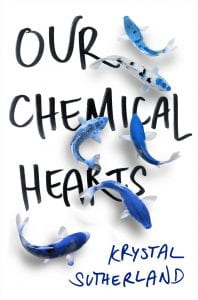 Henry – at 17 has never had a real girlfriend. Lola – had a fling with Henry, but then moved on to a relationship with Georgie. Murray – comical crazy over-the-top Aussie friend is thrown into the mix. (Maybe he’s a good drawcard for Australian YA readers?)
Henry – at 17 has never had a real girlfriend. Lola – had a fling with Henry, but then moved on to a relationship with Georgie. Murray – comical crazy over-the-top Aussie friend is thrown into the mix. (Maybe he’s a good drawcard for Australian YA readers?)
Then, the elusive Grace turns up in their senior years of high school. Lola thinks Grace is competition for Henry. Muz (Murray) thinks she may be a zombie, werewolf or worse. But Henry is enamoured – he thinks.
When they are teamed as editors of the school newspaper, Henry and Grace have to spend more time together and things evolve. But Grace has an unexplained past – one she seems unwilling to reveal to Henry.
In ‘Our Chemical Hearts’ Henry is a somewhat gentle teenager – up till now, not too worried about what others think of him – until he meets Grace. Then, as he tries to understand a little bit about her, he finds himself in the throes of his ‘first love’. Grace, hurt by recent losses, is hot and cold in the relationship which confuses him and he digs deeper.
“I fell asleep… thinking of Grace Town and how, if people really were assembled from pieces of the universe, her soul was made of stardust and chaos.” (Is this Henry experiencing true love?)
Krystal Sutherland has a great story in this debut novel. There are moments of laughter and tears (I did both) as Henry and Grace search to understand each other, find their hearts and ultimately, themselves. Cute vignettes are exchanged between Henry and Grace (in texts, notes and letters) and funny (maybe over-the-top) quips from Murray and Lola add a friendly flavour to this touching and relatable tale.
# ‘Our Chemical Hearts’ is due for movie release sometime in 2020 – why not get to know the characters and read it before then?
## Why are there fish on the cover? (Maybe Ricky Martin Knupps II knows?)
 Some stories touch your heart – is that why you like them?
Some stories touch your heart – is that why you like them?
 What are your friends like? Do they talk, act and think the same as you? Or do they have a few quirky differences in their personalities?
What are your friends like? Do they talk, act and think the same as you? Or do they have a few quirky differences in their personalities? Nate wonders what really makes people who they are. Is it determined at birth, or is it a result of how you are raised? Either way, things are not looking good for him. His dad is abusive, his mother is dead and he’s just finished 18 months in juvenile detention. Now he is off to some unknown location to stay with some unknown family member – his uncle, his mother’s brother.
Nate wonders what really makes people who they are. Is it determined at birth, or is it a result of how you are raised? Either way, things are not looking good for him. His dad is abusive, his mother is dead and he’s just finished 18 months in juvenile detention. Now he is off to some unknown location to stay with some unknown family member – his uncle, his mother’s brother. “There are lots of things worse than school.”
“There are lots of things worse than school.”